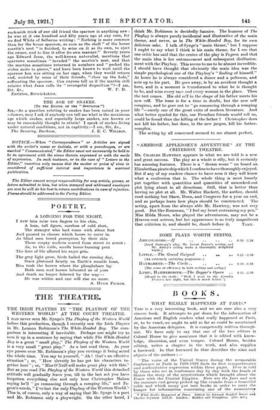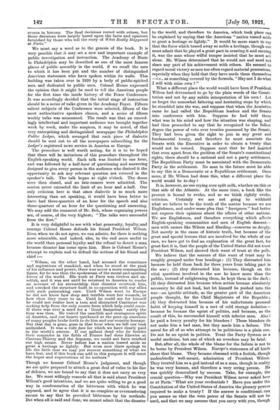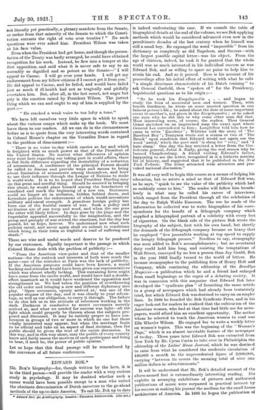13 0 0 K S.
WHAT REALLY HAPPENED AT PARIS.* Tins is a very interesting book, and we are sure also a very sincere book. It attempts to put down for the information of American and English readers what really happened at Paris, or, to be exact, we ought to add as far as could be ascertained by the American delegates. It is competently written through- out. We have only to say that one of the two editors is Colonel House to give assurance that it is edited with know- ledge, discretion, and even temper. Colonel House, besides editing, writes a chapter in the work, and also supplies a foreword. In that foreword he thus describes the aims and objects of the authors :— " The voice of the United States during the memorable Conference at Paris in 1918-1919 finds its first comprehensive and authoritative expression within these pages. Here is told by those who sat in conference day by day with the beads of States the story of the negotiations which brought about the Peace with the Central Empires. Here are the facts and not the rumours and gossip picked up like crumbs from a bountiful table and which many put into books in order to meet the hunger for information concerning one of the momentous • What 1feall4 Happened at Paris.. Edited by Edward Mandell HMIs"! and Charles Seymour Litt.D. London; Hoddcr and Stoughton. 125e. events in history. The final decisions rested with others, but those decisions were largely based upon the facts and opinions furnished by those who tell the story of What Really Happened at Path."
We must say a word as to the genesis of the book. It is very possible that it may set a new and important example of public investigation and instruction. The Academy of Music in Philadelphia may be described as one of the most famous places of public assembly in the world, if we recall the uses to which it has been put and the number of distinguished American statesmen who have spoken within its walls. This building was taken over in 1920 by a body of public-spirited men and dedicated to public uses. Colonel House expressed the opinion that it might be used to tell the American people for the first time the inside history of the Peace Conference. It was accordingly decided that the initial stage of instruction should be a series of talks given in the Academy Foyer. Fifteen salient subjects of the Conference were selected, fifteen of the most authoritative speakers chosen, and a series of fifteen weekly talks was announced. The result was that an exceed- ingly intellectual and important audience was brought together week by week, under the auspices, it may be noted, of that
very enterprising and distinguished newspaper the Philadelphia Public Ledger, which arranged that each piece of dialectic should be sent out to all the newspapers subscribing for the Ledger's registered news service in America or Europe.
The procedure is well worth noting, for it is to be hoped that there will be imitations of this procedure throughout the English-speaking world. Each talk was limited to one hour, and was followed by a half-hour of questioning and answering designed to give every person in the audience who desired it the opportunity to ask any relevant question not covered in the speaker's talk. The talk began at eight o'clock. The doors were then closed, and no late-corners were admitted. The session never exceeded the limit of an hour and a-half. Our only criticism here is that since dialectic is so much more interesting than set speaking, it would have been better to have had three-quarters of an hour for the speech and also three-quarters of an hour for the questioning and answering. We may add the comment of Mr. Bok, whose organizing powers are, of course, of the very highest: "The talks were successful from the first."
It is very delightful to see with what generosity, loyalty, and courage Colonel House defends his friend. President Wilson.
Even when we do not agree, we can admire, for there is nothing more admirable, and indeed, also, in the end more useful to the world than personal loyalty and the refusal to desert a man because disaster has come upon him. Here is Colonel House's attempt to explain and to defend the actions of his friend and chief
Wilson, on the other hand, had aroused the conscience and aspirations of mankind, and when he stood at the peak of his influence and power, there was never a more commanding figure, for he was then the spokesman of the moral and spiritual forces of the world. His work at Paris was tireless and un- selfish, and it was not until he returned to America to render an account of his stewardship that disaster overtook him, and wrecked the structure built in co-operation with our allies with such painstaking care. Until Wilson went to Europe he did not know how deep and terrible were her wounds, or how close they came to mi. Until he could see for himself he could not realize how a torn and distracted Continent was seeking help from the only source from which help could come. If there was ever a need for a ' Good Samaritan' surely the time was then. He voiced the unselfish and courageous spirit of America, and our hearts quickened as the pent-up emotions of many peoples broke forth to do him and our country homage. But that day is gone, gone in that hour when we left our task unfinished. It was a voice face for which we have dearly paid in the world's esteem. If our gallant dead who lie besides their comrades in the fields of France had done likewise at Chateau-Thierry and the Argonne, we could not have reached our high estate. Never before has a nation tossed aside so great a heritage so lightly. But even now there springs to life the faith that we may yet recover something of what we have lost, and if this book can add to this purpose it will meet the hopes and expectations of its authors."
Though we honour Colonel House's judgment, and though we are quite prepared to attach a great deal of value to his line of defence, we are bound to say that it does not carry us very far. We most willingly concede all that its said about President Wilson's good intentions, and we are quite willing to go a good way in condemnation of the bitterness with which he was opposed, and to agree that it is no complete or overmastering excuse to say that he provoked bitterness by his methods. But when all is said and done, we oannot admit that the disaster
to the world, and therefore to America, which took place can be explained by saying that the American "nation tossed aside so great a heritage so lightly." It would be more exact to say that the force which tossed away so noble a heritage, though one must admit that he played a great part in creating it and. earning it, was the man whose wilful temper insisted that he must act alone. Mr. Wilson determined that he would not and need not share any part of his achievement with others. He seemed to regard moral victory as men too often regard material possessions, especially when they hold that they have made them themselves —i.e., as something covered by the formula, "May not I do what I will with mine own ? "
What a different place the world would have been if President Wilson had determined to go by the plain words of the Consti- tution and not by any subtle interpretation of his own ! Let us forget the somewhat faltering and hesitating steps by which he stumbled into the war, and suppose that when the Armistice came he had called the Republican leaders and the Senate into conference with him. Suppose he had told them what was in his mind and how the situation was shaping, and had then proceeded to say that he recognized to the fullest degree the power of veto over treaties possessed by the Senate. They had been given the right to join in any great and fundamental treaty, and therefore he must associate the Senate with the Executive in order to obtain a treaty that would not be vetoed. Suppose next that he had insisted that even apart from the problem of the Senate's constitutional rights, there should be a national and not a party settlement. The Republican Party must be associated with the Democratic Party in the settlement. No man in the future must be able to say this is a Democratic or a Republican settlement. Once more, if Mr. Wilson had done this, what a different place the world would be to-day !
It is, however, no use crying over spilt milk, whether on this or that side of the Atlantic. At the same time, a book like the present is bound to evoke, and as we think rightly evoke, criticism. Certainly we are not going to withhold what we believe to be the truth of the matter because we are Englishmen, and under some plea that "foreigners" had better not express their opinions about the affairs of other nations. We are Englishmen, and therefore everything which affects English-speaking communities and men of English descent— men with names like Wilson and Harding—concerns us deeply. Not merely in the cause of historic truth, but because of the great and special lessons that are involved for the whole of our race, we have got to find an explanation of the great fact, for great fact it is, that the people of the United States did not trust President Wilson, and showed their want of trust at the polls.
We believe that the sources of this want of trust may be roughly grouped under four headings : (1) They distrusted him because he held them back for three years from taking part in the war ; (2) they distrusted him because, though on the vital questions involved in the war he knew more than the public, instead of enlightening them, he kept them in the dark ;
(3) they distrusted him because when action became absolutely necessary he did not lead, but let himself be pushed into the war—an ignoble attitude, as the greater part of the American people thought, for the Chief Magistrate of the Republic ;
(4) they distrusted him because of his unfortunate personal habit of keeping himself in a sort of cold storage isolation— because he became the egoist of polities, and because, as the result of this, he surrounded himself with inferior men. Alas ! he paid a heavy penalty for his blunders ! These blunders do not make him a bad man, but they made him a failure. The moral for all of us who attempt to be politicians is a plain one. Do not be an egoist in politics. Treat the Party System as a useful medicine, but one of which an overdose may be fatal.
But, after all, the whole of the blame for the failure is not to be borne by President Wilson. Europe's statesmen of all kinds share that blame. They became obsessed with a foolish, though undoubtedly well-meant, admiration of President Wilson. They treated him as a god instead of as a man, though in reality he was very human, and therefore a very erring person. He was quickly demoralized by success. Take, for example, the crucial question—Why was President Wilson never asked here or at Paris, "What are your credentials ? Have you under the Constitution of the United States of America the plenary powers required to make a treaty? If the answer is conditional, can you assure us that the veto power of the Senate will not be used, and that we may assume that you carry with you, though not literally yet practically, a plenary mandate from the Senate, or rather from that minority of the Senate to which the Consti- tution entrusts the right of veto over treaties ? " No such questions were ever asked him. President Wilson was taken at his face value.
Even when the President had got home, and though the presen- tation of the Treaty was badly arranged, he could have obtained recognition for his work. Instead, he flew into a temper at the first opposition, and said what it is never safe to say to an assembly so dignified and so potent as the Senate—" I will appeal to Caesar. I will go over your heads. I will get my endorsement from my fellow-citizens if I cannot get it from you." He did appeal to Caesar, and he failed, and would have failed just as much if ill-health had not so tragically and pitifully overtaken him. But, after all, in the last resort, not anger but pity is the emotion raised by President Wilson. The justest thing which we can and ought to say of him is supplied by the poet :—
" He cracked a weak voice to too lofty a tune."
We have left ourselves very little space in which to speak about the various essays which make up the book. We must leave them to our readers. All we can do in the circumstances before us is to quote from the very interesting words contained in Colonel House's chapter on the Versailles Peace in regard to the problem of disarmament :—
" There is no voice to-day which carries so far and which is freighted with BO much power as that of the President of the United States. No matter what differences of opinion may exist here regarding our taking part in world affairs, there is but little difference regarding the desirability of a reduction of armaments. A conference of the principal Powers should be called to discuss and provide ways and means to bring about limitation of armaments among themselves, and later to use their influence through the League of Nations to make it world-wide. It is to be hoped that President Harding may do this great and needful thing. Should he succeed in bringing this about, he would place himself among the benefactors of mankind and mark the beginning of a new era. Statesmen could no longer sit in seclusion, hidden behind doors, and formulate policies the enforcement of which would necessitate military and naval strength. A grandiose foreign policy has been one of the fruitful causes of war. Such a policy and mi:itarism are of one warp and woof, and when tho one goes the other will likely follow. In days gone by the jingo and the imperialist appealed successfully to the imagination, and the pomp and panoply of war stirred the emotions, but the day has passed, let us hope, forever. We understand now what such policies entail, and never again shall we submit to conditions which bring in their train so frightful a trail of suffering and death."
These are wise and useful words and deserve to be pondered by our statesmen. Equally important is the passage in which Colonel House deals with the problem of publicity :— "From the American view-point and that of the smaller nations—for the outlook and interests of both were much the same—one of the mistakes at Paris was the lack of publicity. If the American purposes could have been known, a moral backing and stimulus would have been given our representatives which was almost wholly lacking. This sustaining force might have come from the entire world, and would have had a double- effect inasmuch as it would have weakened the opposition and strengthened us. Wo had taken the position of overthrowing the old order and bringing a new and different diplomacy into play. Open covenants, openly arrived at,' was one of the popular slogans of the day, and it was clearly to your advan- tage, as well as our obligation, to carry it through. The failure to do this left UB in the attitude of reformers working in the dark. Darkness is conducive to secret covenants secretly arrived at, and what we needed for success was light—all the light which could properly be thrown about the subjects pro- posed and discussed. It may be entirely proper to have con- ferences in groups of two or more in which no one but those vitally interested may appear, but when the meetings begin to be official and take on an aspect of final decision, then the public should be given the text of the entire discussion. In this way, and in this way alone, may the public of every country know and fairly assess the motives of each participant and bring to bear, if need be, the power of public opinion."
Let us hope that this final passage will be remembered by the conveners of all future conferences.




































 Previous page
Previous page